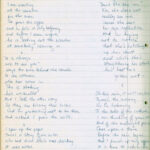The death of Pastor Fred Phelps, the notorious leader of the Westboro Baptist Church (WBC), marked a moment of reflection on his legacy and the organization he founded. While some may see his passing as a call to glory, considering the hateful doctrines preached by his ministry, it’s perhaps more realistic to view it as a biological end. Regardless, it provides an opportunity to examine the man, his church, and particularly, the Westboro Baptist Church Songs that have become synonymous with their controversial protests.
My own history with “Gramps,” as his followers affectionately called Phelps, involved creating two BBC documentaries: “The Most Hated Family In America” (2006) and “America’s Most Hated Family in Crisis” (2010). Spending roughly a month embedded with WBC members, I sought to understand what motivated them. These individuals, holding seemingly normal jobs in Topeka, Kansas – lawyers, correctional officers, salespeople – dedicated their free time to traveling across the US. Their mission? To picket funerals and public events, brandishing placards filled with slogans like “Thank God for Dead Soldiers,” “Fags Eat Poop,” and the infamous “God Hates Fags.” They gained notoriety for targeting funerals of soldiers killed in Iraq and Afghanistan, claiming these soldiers were being punished for defending a nation they deemed doomed due to its tolerance of homosexuality. And central to their provocative demonstrations were the Westboro Baptist Church songs, adapted to amplify their message of hate.
Louis Theroux engaging with Westboro Baptist Church members during the filming of his initial documentary, offering a glimpse into their family dynamics and beliefs.
The Doctrine Behind the Discordant Tunes
The WBC’s scriptural basis is rooted in Leviticus, specifically the verse condemning homosexuality. However, they conveniently ignore adjacent verses with similar proscriptions, like those against astrology. Notably, Jesus Christ, whose teachings they claim to follow, remained silent on homosexuality and funeral protests, instead emphasizing kindness and humility. This selective interpretation of scripture forms the bedrock of their hateful ideology and is reflected in the aggressive lyrics of Westboro Baptist Church songs.
The WBC is primarily a family affair, dominated by Fred Phelps’ descendants and their spouses, residing in a Topeka compound they call Zion. Phelps was the driving force, establishing the church when anti-gay sentiment was more prevalent in American Christian circles. While societal attitudes evolved, leaving the WBC behind in their fire-and-brimstone approach, Phelps’ personal obsession with homosexuality remained unwavering. This obsession fueled the hateful messages prevalent in their protests and, consequently, in Westboro Baptist Church songs.
“God Hates Fags”: The Anthem of Hatred and Parody
The church’s anti-gay picketing reportedly began in the 1980s in response to a Topeka park becoming a cruising ground. This local issue escalated into a broader doctrine: America is fallen, damned in God’s eyes, and anyone serving under the US flag – or not a WBC member – is condemned. Their worldview is starkly binary: everyone is either a “fag” or a “fag enabler,” a category encompassing figures from Desmond Tutu to Princess Diana. Salvation, according to the WBC, is exclusive to those baptized into their church, actively participating in protests, waving hate-filled placards, and, importantly, singing Westboro Baptist Church songs that reinforce their message at political events and locations they deem associated with tolerance of homosexuality.
During my time with them, I witnessed a picket of a hardware store selling Swedish vacuum cleaners. The rationale? Sweden had imprisoned a pastor for homophobic preaching. This bizarre logic exemplifies the WBC’s worldview, which they articulate not only through signs but also through the aggressive parodies that comprise Westboro Baptist Church songs. These songs, often adaptations of popular tunes, are rewritten with hateful lyrics, turning familiar melodies into vehicles for their message of condemnation.
Westboro Baptist Church members staging a protest at Arlington National Cemetery, demonstrating their controversial practice of picketing military funerals and using songs to amplify their message.
The Banal Face of Bigotry and the Power of Protest Songs
The jarring aspect of these pickets was the contrast between the venom of the signs and songs, and the mundane family interactions. For the Phelpses, it was routine, a “day at the office,” filled with casual chatter amidst hateful slogans. Even young children carried placards and participated in singing Westboro Baptist Church songs with lyrics like “Thank God for 9/11” and “Fag Sweden.” This normalization of hate, expressed through both actions and Westboro Baptist Church songs, is a disturbing element of their indoctrination.
Their protests have undoubtedly inflicted pain on countless individuals, particularly mourners seeking solace at funerals. They even considered picketing the funeral of Amish children killed in a shooting, twisting the tragedy into a consequence of parental tolerance towards homosexuality. While they eventually relented in exchange for radio airtime, this incident highlights their exploitative tactics and the deeply offensive nature of their demonstrations, underscored by the hateful lyrics of Westboro Baptist Church songs.
However, the WBC’s actions also create misery within their own ranks. They impose a distorted worldview on their youngest members, threatening banishment for any deviation or lack of commitment. Ex-members are ostracized, severing all ties with the church. This internal pressure cooker, combined with the external condemnation they court, defines the oppressive environment of the WBC, where even Westboro Baptist Church songs become instruments of control and fear.
Misconceptions and the Paradox of Civility
Despite their hateful rhetoric and the aggressive nature of Westboro Baptist Church songs, there are misconceptions about the WBC. Unlike groups like the KKK, they claim not to hate gay people, only that God does. Paradoxically, some interactions with WBC members can be civil. For many Phelps family members, hostility is a role, dictated by doctrine. Videos even show counter-demonstrators engaging in cordial conversations with picketers. This duality – hateful message delivered with a veneer of civility – adds another layer of complexity to understanding the WBC and the individuals who propagate Westboro Baptist Church songs.
Pastor Phelps himself, however, was different. He seemed to genuinely harbor hatred. He disliked my questions, dismissing me as “too dumb” and a “hellbound sinner.” This personal animosity, contrasting with the sometimes-civil demeanor of his followers, suggests a more profound level of bigotry in the church’s founder, a bigotry that permeated the very foundation of Westboro Baptist Church songs.
Speculations about Phelps’ motivations range from repressed homosexual urges to childhood trauma. However, his animosity towards the military might offer a partial explanation for the funeral pickets. Ultimately, he appeared to be an angry, bigoted man thriving on conflict. Reports from his estranged children detail physical abuse towards his wife and children, alongside substance abuse issues. Yet, he was also a lawyer who won civil rights cases, receiving an NAACP award – a stark contradiction highlighting the complexity of his character and the deeply ingrained contradictions within the WBC, reflected even in the seemingly straightforward hatred of Westboro Baptist Church songs.
Shirley Phelps-Roper protesting with her son, Luke, showcasing the family-driven nature of the Westboro Baptist Church and their continued use of public demonstrations and songs to spread their message.
The Audience of Outrage: Counter-Protests and Indifference
The WBC thrives on opposition. Counter-demonstrators, from patriotic bikers revving engines to drown out Westboro Baptist Church songs at funerals, to students protesting campus pickets, fuel their narrative of persecution and divine righteousness. They interpret hatred as a sign of godliness, quoting Bible verses to support this view. Indifference, however, is a greater challenge, though it hasn’t deterred them significantly. The very act of creating and performing Westboro Baptist Church songs is, in part, designed to provoke a reaction, to avoid indifference.
Reports of Phelps’ “excommunication” before his death suggest internal power shifts. Shirley Phelps-Roper, his daughter, emerged as a dominant figure, a skilled organizer capable of delivering hateful messages while managing complex protests. However, recent observations suggest a possible shift in leadership towards male figures like her brothers and Steve Drain, a former documentary maker who joined the church. The future direction of the WBC, and whether the nature of Westboro Baptist Church songs will evolve, remains uncertain.
Legacy of Hate and the Chains of Belief
Despite internal changes, significant shifts in the WBC’s core ideology are unlikely. It operates more like a family than a cult, a structure that can withstand the loss of a leader. However, the hope remains that internal feuds and fragmentation might lead to moderation and reconnection with estranged family members.
The chilling reality is the enduring legacy of Fred Phelps. His offspring are raised to believe abuse is kindness, their family bonds intertwined with a twisted religious creed. Leaving the church means not just losing family but, in their belief system, forfeiting salvation. This deeply ingrained indoctrination, perpetuated through doctrines and the very Westboro Baptist Church songs they sing, presents a formidable challenge to any hope of change or moderation within the WBC. The soundtrack of hate, therefore, is likely to continue, echoing the divisive legacy of Fred Phelps for years to come.


